With the increase of anti-Asian racism due to Covid-19 on the back of my mind – experiencing it myself and listening to loved ones sharing their stories to reading accounts online – this act of immersing myself into the world of film was especially healing. In early 2020, pre-global pandemic life, my partner and I had the pleasure of attending the Berlin International Film Festival. I saw some of the best independent movies on the circuit, we had the chance to witness legendary Taiwanese filmmaker Ang Lee in conversation with Japanese filmmaker Hirokazu Kore-eda. They exchanged thoughts on time and space, overcoming creative struggles, the inter-relatedness of kindness and sadness in the Eastern world.
To watch ourselves move, and to hear ourselves speak. To envision. As we transitioned to spending more time indoors, we came across Vietnamese Canadian Carol Nguyen’s 15-minute documentary “No Crying at the Dinner Table,” an intimate conversation with her own family about intergenerational trauma and the things left unsaid.
After watching Carol’s documentary, I remembered my friend Julie Mai from Tkaronto, also known as Toronto, mentioned this particular film to me back in November 2019. She had worked on it with Carol and had suggested I go check out the International Documentary Film Festival Amsterdam, where No Crying at the Dinner Table was to screen. In this age of long-distance social media friendships, Julie and I have been friends since 2018, when we connected over being the few Vietnamese women appreciating the practice of running.
Weeks later, the three of us – Julie, a writer and capacity builder herself, and the film director Carol Nguyen, who is based in Montreal and I – sat down over Zoom on May 6th 2020 to chat about what brings them joy during this pandemic, their upbringings as Vietnamese Canadian, No Crying at The Dinner Table, representation, intergenerational trauma, their connection to Vietnam as well as their future visions and dreams.
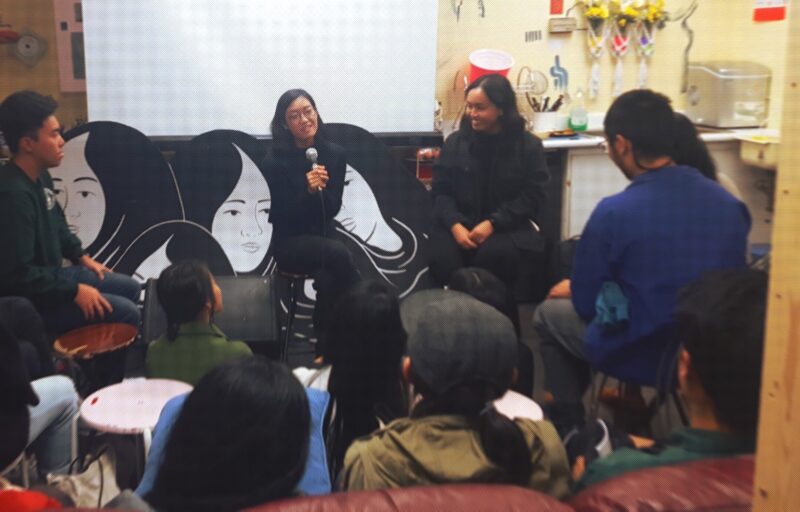
Thi Minh Huyen Nguyen: I’m really grateful for this global Vietnamese diaspora, it really has shaped me in a way that I wasn’t able to express and see myself here in Germany. So, Julie told me she contributed to your film Carol as well. So, it’s pretty amazing to connect the dots on a global scale, first off: what brings you joy right now?
Julie Mai: I really love this question. This pandemic has given a lot of time for introspection. That brings a lot of joy `cause I’m a very active person. I have a very complicated relationship with technology, but it’s really nice to be attentive, to the smallest little things that I never really paid attention to before.
Carol Nguyen: What this quarantine taught me is to enjoy the little things more like just going out for a walk yesterday. I went out for a run and I was just watching dogs and it makes me realize that I have to chill more and kind of reassess the way that I find my happiness and the way that I get my motivation and energy.
How does your everyday look like right now, do you have found routines that keep you somewhat stable and seen?
Carol Nguyen: I still do now because I need a schedule and I need to know what I’m doing every day, but I usually try to incorporate, some sort of exercise, a little bit of French because I’m on this journey to learning French, a little bit of reading and a movie and whatever work that I have that day.
Julie Mai:. Every day is a little different for me because it really depends. A lot of the time I’ve found myself holding a lot of space for people. Um, the other day, some people were feeling really anxious and I was like, let’s just do a tarot card reading together. And that’s what we did. It’s more like guidance and like to remind you to focus on certain things in your life and to sort of help with that. I’m not someone who really needs a strict schedule.
How was it for you growing up? Did you happen to be the only Asian Canadian in your class or in your grade or in your school? If you could elaborate on that, Seeing yourself, not seeing yourself, especially in the industries you two are working today.
Carol Nguyen: The neighborhood that I grew up in is an immigrant neighborhood, so it never occurred to me that there was a diversity problem. In Montreal, the progression in diversity and racism is so much more behind than in Toronto. I would experience walking on the street when I was in Toronto, when I was younger, people going up to you and saying, Ching Chong or something racist like that. But within my whole life, compared to what I experienced in Montreal and Quebec, I would experience the same amount of racism and discrimination in four years, living in Montreal than in my whole 18 years in Toronto. And I don’t know how much you know about Quebec, but it’s kind of like the French province of Canada. So the laws, the history and the culture is very, very different. I feel like my experience of racism and my understanding of diversity in Canada has been so different than these people in Montreal. And we live so close to each other where we’re bordering provinces.
Julie Mai: To me, my understanding of representation dramatically differs. I grew up outside of Toronto with a lot of Catholic conservatives. I had no sense of what Vietnamese identity was. The only understanding I had was like in the little bungalow that my family lived in. I spoke and acted a specific way and ate food that I would not see in school. When I was in college, I became curious about understanding politics and supporting Vietnamese voters. I’m formally trained as an artist and yet I worked in political organizing and ended up becoming very interested in questions like: how do we get more young people involved? How do we get them involved in a way that’s not a super academic base, that’s a little bit more open? How do we create town halls for Viet folx to understand how and what is happening?
Art is a very easy vehicle to provide bridges and spaces for people to act that that’s a little bit more accessible. At that point I had met Carol and a number of other people. And now we have this Vietnamese group that we run every month, but has now become weekly where we chat. We’ll have discussions about readings and it’s people from different disciplines. Thus, my understanding of representation changes a lot.
When you step out into your respective industries and your workplaces or outside of your homes and your communities, if you happen to be the only person of color or Asian Canadian, how do you gain strength to move forward with the things you do?
Carol Nguyen: I think I get my strength from my peers and the people around me who are willing to listen and who are willing to understand. I never really thought that, kind of growing up with my background in Toronto and being surrounded with diverse groups, people, and going to Vietnamese school and having that community already, I never thought that I was doing anything extraordinary. So, I think also being given the space and the community behind me really gives me strength.
Julie Mai: I remember there was an incident at this private screening we did in which someone had asked a question to Carol. They really wanted to do a similar project and they were asking Carol, how have you done your interviews? How do you start? And I remember just watching that sitting right beside Carol. I thought how endearing it was, because I remember when Carol, you met me, you had similar questions and it was like seeing the same conversation play out in front of me. It was like this one film had helped someone else want to do something that Carol had asked me a couple of years back. Seeing the small little moments and small fragments, that to me is like a sign of healing and a sign of acknowledging certain parts of our difficult histories and pasts.
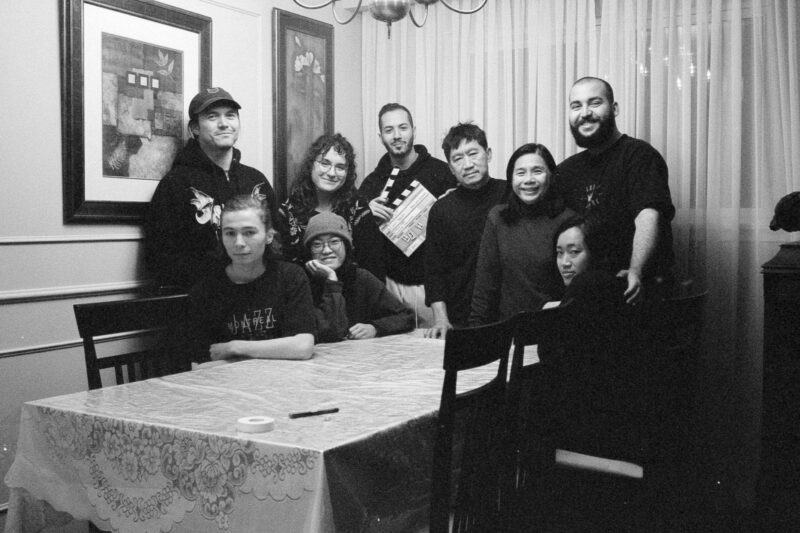
In an interview Carol, you mentioned intergenerational trauma and language barriers with your family and your parents. How do you bridge all these? And also stay true to yourself?
Carol Nguyen: I feel like I never really know the topic that I’m talking about until sometimes the film is made. I had no idea what intergenerational trauma was and what I was feeling until I made this film and a program. I feel like my art comes from my emotions and my feelings. And I can’t pinpoint what it is. I mean, it’s very confusing to me. I find it difficult every day to try to balance being a good daughter, being an artist, wanting to do what I do, but also trying to do good for the family. I think what I’ve learned is being second generation and having all of these resources that my parents didn’t have and assimilating more than they have. My responsibility is to take more initiative than they do in certain situations. I have to learn how to fight in a healthy way with them. I have to learn how to forgive. I have to learn when is the right way to put things under the rug as we have and how to communicate, how not to push them, how, when to live my own life and not have to involve them in when I want them to be involved.
Julie Mai: The thing that you can’t ever disagree is with their lived experiences. And I think that speaking a lot to intergenerational trauma is understanding when we conflate our experiences and our feelings and how to understand how to differentiate those things, because oftentimes you can model them.
Do you have role models living or dead? Funnily enough, I went to the Berlin International Film Festival and there, I watched Afterlife and Hirokazu Kore-eda together with Ang Lee were there to speak.
Carol Nguyen: I love Kore-eda! I don’t know if I would call him a role model though, it‘s hard for me to identify a role model. I feel like there aren’t many Vietnamese filmmakers out there yet, but, in terms of career wise, like Lulu Wang is amazing at what she has accomplished. I think a lot of my mentors, who don’t really have that much importance, but kind of their heart and their dedication to helping people improve and their empathy towards people situations has really helped me kind of understand what I want to be more of.
Julie Mai: Yeah. I can’t think of a role model just like Carol, but I can think of a mentor. Her name is Hoa Nguyen and she always asks me who are my page mothers, who are the people who have written something that I don’t know who they are, but in their writing, there’s a sense of intimacy that I feel and who they are and what they’ve written and how it has helped me change as a person.
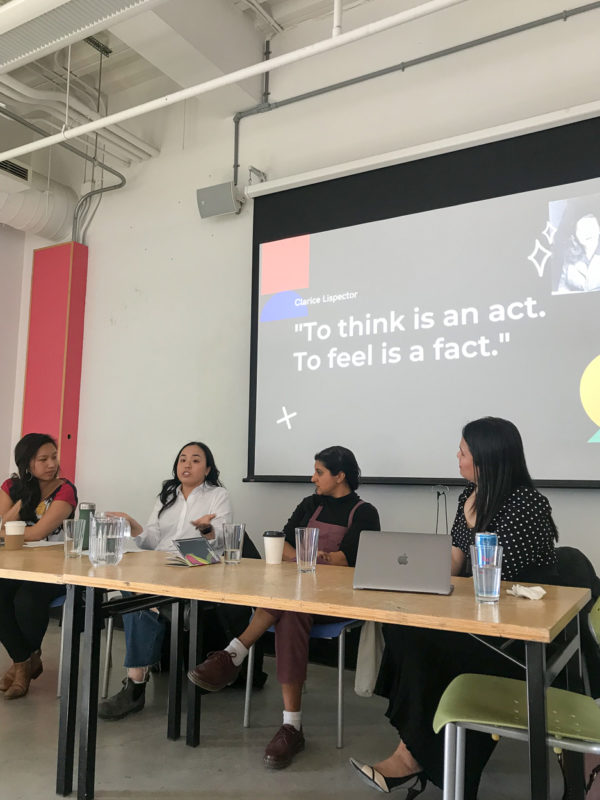
In one of her readings for The Mountains Sing, Nguyen Phan Que Mai said that she wants to bring more arts and literature from the global diaspora to Vietnam for the people there to appreciate the multiple viewpoints. She said, all these stories and all your films and your writings and your poetry are also connected to the story of Vietnam. I was wondering if you can relate to that or if you have a deep connection to Vietnam?
Carol Nguyen: My first semester of my last year of university, I went to Vietnam for the first time in my life. I met a lot of relatives and friends, but I also had identity crises. A lot of us have expectations for those who haven’t been back, the expectations for what Vietnam should be like and what it should give to us, depending on the stories that we’ve heard from our parents and being back and seeing that, like all of these things have basically vanished, really overwhelmed me and confused me. I’m still trying to better understand my identity. Hopefully one day my family will go back and I’ll be able to explore more facets of their past, but from that trip alone, it was really influential. I’m going to make a film about that. Vietnam, to me, it’s still all mysterious and confusing, seeing all the cultural aspects of Vietnam and the kind of communities that exist within it, it just made me have a better understanding that I don’t know much at all.
Julie Mai: I think a lot of how the diaspora is shaped can be a movement and it’s not just like a standard country and homeland. The idea of indebtedness to our country, it’s something that I often really disliked because it feels patriotic and nationalistic. However, I do understand where Nguyen Phan Que Mai comes from, but I don’t feel a need to feel like I have to go to a country. It just feels so much out there that I have no interest in. I don’t call it motherland or homeland because it is not the country I was born in. I do have connections to it, but it is very far fetched from my reality. I’ve yet to understand when we will move away from centering trauma as the anchor point of every conscious decision, centering the war as every single conversation. Moving beyond that and looking at more imagining ways to talk about our future and present.
What makes you feel home?
Julie Mai: Home is something that was never easy for me as a kid. And I had a very traumatic turbulent childhood. There’s like this weird connection that we all have. I went to Washington DC last year in the springtime, I remember I had reached out to a friend who was living in DC and they’re Vietnamese and it was such a weird moment because within all of this weird energy, there was this isolated moment of conversation I had with another Vietnamese woman about our relationship with our identity, with our relationship with politics. It’s like these small little pockets of conversation and to go back to intergenerational trauma, it’s these small moments of healing and progress that I can see. And I think that is very interesting and that to me is comforting and shows a sign of love towards one another.
Carol Nguyen: I can tell you that I feel most at home in Canada. I kind of had that homesickness in Vietnam and that I don’t really fit in and I can’t really express my cross cultural identity there. That was the first time that I kind of thought to myself home is in Canada. Again, within Canada, it’s so complicated because we have the boundaries of Toronto and Quebec. So, I don’t know if home is where I grew up anymore. If home was in the house and if my parents are homeless, or if that’s more something that you carry with you. That’s something that I’ll try to figure out in my life as I grow older too.
Speaking of futures and speaking of dreams, what is your dream? What would be your legacy? How do you imagine the future?
Carol Nguyen: There are facets to this answer, because there’s what I want from my career, my family, my love life, my future, I would like to be able to go as far as I can really. I really want to do what I do and be able to do what I do without having to be questioned to prove myself. I think that’s a very common thing with all artists. It’s not just me as a female Vietnamese person. I think the simple answer for many Asians is that I want to be able to give back to my family at some point, that starts with being financially independent and then being able to support them and take care of them when they’re old. I want to be able to raise a family and be a mom, and I want to be able to somehow give back to the younger generation, whether that’s through mentorships, through academia, through creating programs. I wouldn’t be here without all the mentors and the programs that supported me, really believed in me. So that’s something that I believe in to help the next generations of minors and art.
Julie Mai: I was asked this question recently and there I said: we are all teacher ancestors. How do you acknowledge that you’re an ancestor while also, there are still living ancestors in your life that you’re still writing from. And then, how do you take all those learnings and reverberate that back into whatever the future is. I’m very privileged in which I have younger nieces and nephews. Watching them grow is really fascinating. I want them to live in a safe world, whatever that may be and in a world in which they do not have to fear the skin that they live in, they do not have to feel that they’re being politicized for everything they do. And the fact that they have agency and free will.
Contributor Bios
Author Bio
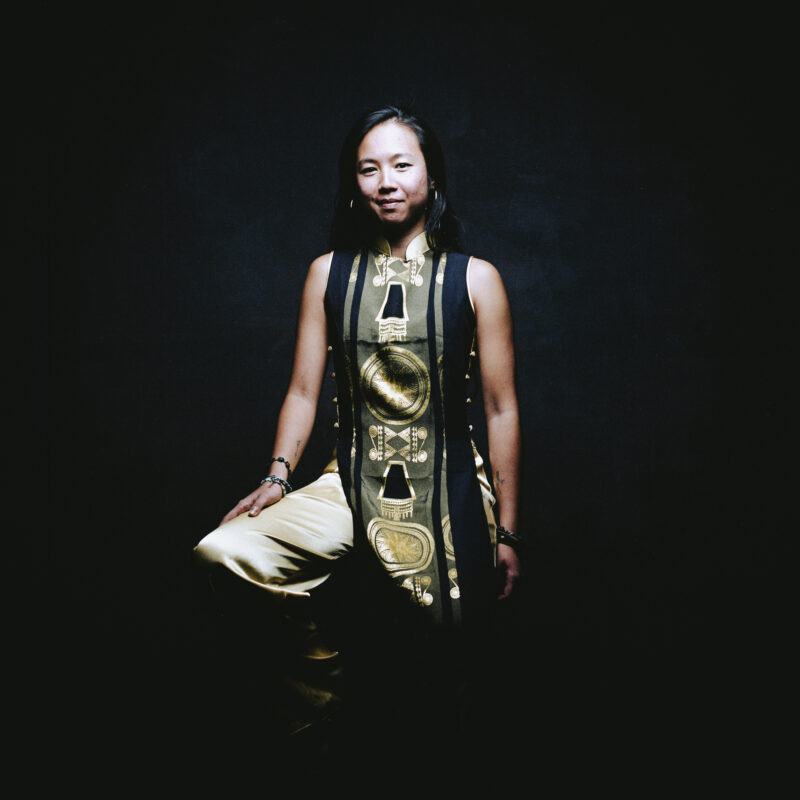
Born in Germany, Thị Minh Huyền Nguyễn is a Vietnamese writer, athlete and activist. She started Gold to Green, an online publication and podcast at the intersections of health, running, sustainability and culture in 2011. Having studied and worked in New York City, Huyen has co-founded WocForward in Brooklyn (a monthly exercise club for and by womxn of color) and Wayv Run Kollektiv back in Berlin to elevate queer, Black and brown, underrepresented runners. When Huyen is not writing or running, she’s pursuing a master’s in media science and involved in anti-racism / discrimination projects such as ichbinkeinvirus.org and biwoc-rising.org.
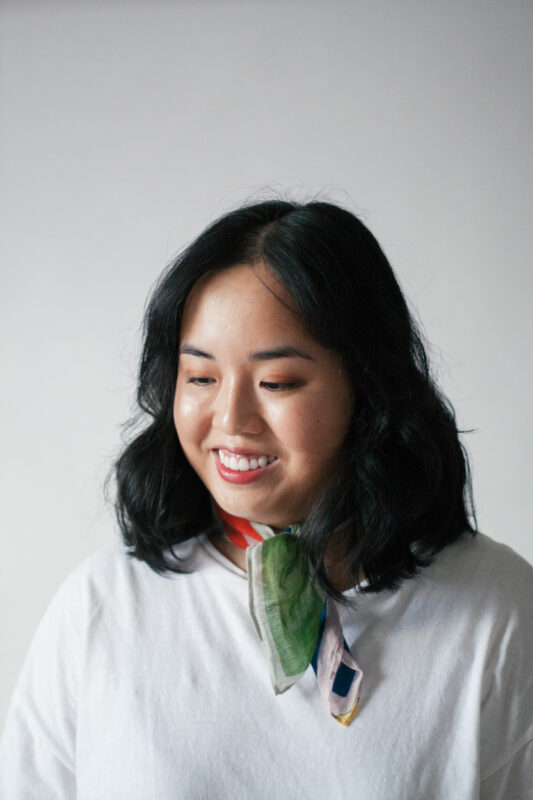 Julie Mai is a capacity builder based in Tkaronto. Raised by two former refugees, she is constantly searching how to develop a language to express herself. She is also a reader, writer, and a workshop facilitator, often collaborating with other creative makers.
Julie Mai is a capacity builder based in Tkaronto. Raised by two former refugees, she is constantly searching how to develop a language to express herself. She is also a reader, writer, and a workshop facilitator, often collaborating with other creative makers.
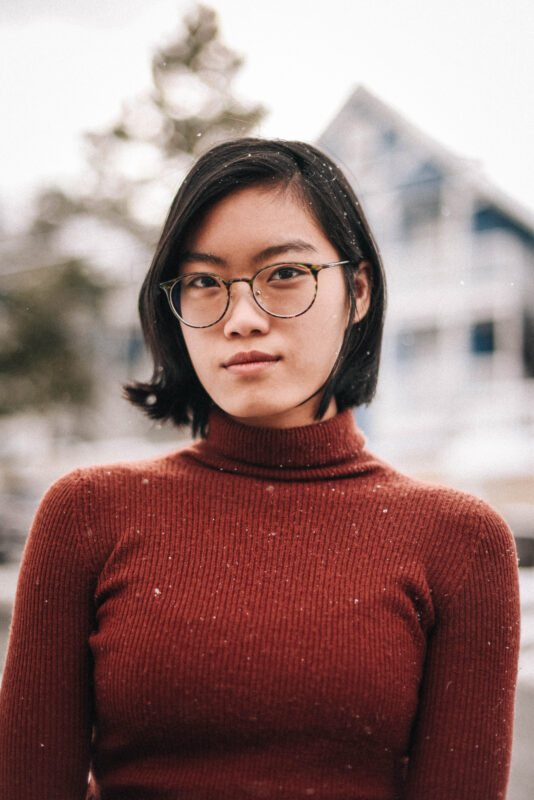 Carol Nguyen is a Vietnamese Canadian filmmaker based in Toronto and Montreal. Her films often explore the subjects of cultural identity, family and memory. Her most recent film No Crying at the Dinner Table premiered at the Toronto International Film Festival and had its international premiere at IDFA 2019, where she was also invited as the Opening Night speaker. It also received the Jury Prize for Short Documentary at SXSW. Carol is a 2018 Sundance Ignite fellow, Adobe Creativity Scholar and a TIFF Share Her Journey ambassador, where she strives to empower diverse voices and women through her own stories and personal experiences in the film industry. Today, Carol is working towards developing her first documentary feature as well as an animated short.
Carol Nguyen is a Vietnamese Canadian filmmaker based in Toronto and Montreal. Her films often explore the subjects of cultural identity, family and memory. Her most recent film No Crying at the Dinner Table premiered at the Toronto International Film Festival and had its international premiere at IDFA 2019, where she was also invited as the Opening Night speaker. It also received the Jury Prize for Short Documentary at SXSW. Carol is a 2018 Sundance Ignite fellow, Adobe Creativity Scholar and a TIFF Share Her Journey ambassador, where she strives to empower diverse voices and women through her own stories and personal experiences in the film industry. Today, Carol is working towards developing her first documentary feature as well as an animated short.


